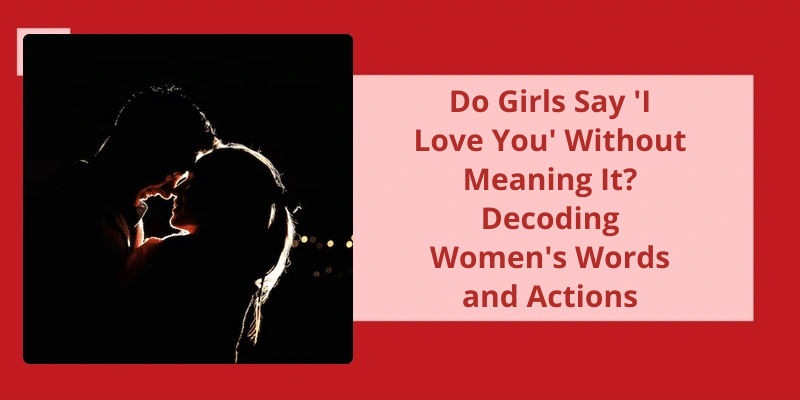Love is one of the most powerful and complex human emotions. Saying those three words – I love you – is often seen as a major milestone in a relationship. However, expressing love comes with certain expectations and responsibilities. When a person says “I love you”, it’s expected to hold a depth of meaning and sincerity behind it. Unfortunately, many people, especially girls, may utter these words without truly meaning them. The reasons behind this can vary from fear of abandonment to wanting to please a partner. This can lead to confusion, hurt, and a loss of trust between partners, making it important to understand why some girls may say “I love you” without truly meaning it.
What Does It Mean When I Girl Says Love You?
It’s important to note that everyone expresses and understands love differently, and the context in which the words are said can alter their meaning. If the words are said in a romantic context, it likely means that the girl has romantic feelings for you. If the words are said in a platonic or familial context, she may simply be expressing her deep fondness and appreciation for you as a friend or family member.
It’s also important to consider the individual girls personality and communication style. Some people may say “I love you” frequently and easily to express their feelings, while others may be more reserved and only say it in very specific situations. Additionally, cultural and societal norms can influence how people express and interpret love, so it’s important to consider these factors as well.
If a girl says “I love you” and youre not sure how to respond, it’s okay to take your time and think about your own feelings. It’s important to be honest with yourself and her about how you feel, whether those feelings are reciprocated or not. If you do have romantic feelings for her, it’s important to communicate those feelings clearly and respectfully, and to be prepared for any response she may have.
At the end of the day, the words “I love you” can carry a lot of weight and meaning, but it’s up to each individual to interpret and respond to them in their own way. Whether youre in a romantic relationship or simply have a close bond with a friend or family member, expressing and receiving love can bring joy and fulfillment to our lives. So if a girl says “I love you,” take it as a gesture of kindness and care, and respond with sincerity and gratitude.
Different Ways People Express Love Besides Saying “I Love You”
- Giving gifts
- Spending quality time together
- Performing acts of service for their loved ones
- Physical touch and affection
- Offering words of affirmation and encouragement
- Showcasing affection through body language
- Listening attentively to their partner’s needs and wants
- Being supportive during tough times
- Going out of their way to make their partner happy
- Displaying trustworthiness and loyalty in the relationship
It’s important for women to know the other reasons behind a man saying ‘I love you’ before jumping into any conclusions. Although it’s usually taken as a sign of genuine affection, sometimes it could mean something else entirely. In this article, we’ll explore these reasons in-depth to help understand why a guy might say ‘I love you’ without really meaning it.
Can a Guy Say I Love You Without Meaning It?
Men know that saying “I love you” can create an emotional bond with their partner, which can be used to advance the relationship physically. Some men use the phrase as a way to speed up the process and take their relationship to the next level.
Pressure from their partner. Women often want to hear those three words and men might feel obligated to say them in order to maintain the relationship. They may not necessarily feel the same way their partner does, but don’t want to disappoint or hurt them by not saying it back.
Fear of losing their partner. Men may use the phrase as a way to keep their partner around, even if they don’t truly love them. They may fear the consequences of not reciprocating those three words, such as a breakup or their partner seeking affection elsewhere.
Emotional manipulation. By making them feel loved and desired, they can get what they want from the relationship without actually having to feel love themselves.
They’re confusing love with infatuation. Men can get caught up in the excitement and passion of a new relationship and mistake that for love. Once the initial high wears off, they may realize that they don’t actually love their partner as they thought they did.
While there are certainly men who say “I love you” with sincerity and affection, it’s important for women to be aware of the potential reasons behind those three words. Women also have to trust their intuition and assess the situation to ensure that when those words are said, they’re coming from a genuine place of love rather than any other motivation.
It’s important to be truthful in our words, especially when it comes to expressing emotions. Simply throwing around the phrase “I love you” without truly meaning it can lead to hurt and disappointment. It’s crucial to understand that words only hold weight when backed up by action and genuine intention. So, is it okay to say “I love you” without meaning it? Definitely not. Let’s explore why.
Is It Okay to Say I Love You Without Meaning It?
Love is more than just a word, it’s a feeling that should be demonstrated through caring actions and meaningful gestures. Expressing love without any intention to act upon it’s insincere and eventually people will notice, especially the person you claim to love. It’s important to understand that love is a powerful emotion and shouldn’t be taken lightly or used for personal gain.
When someone tells you they love you, they’re expecting some form of response that shows reciprocity for the feelings they’ve shared. If you don’t honestly share the sentiment, it’s better not to say anything at all. Dont lead anyone on or create false expectations as a result of being insincere. Love is a strong commitment that requires investment and effort, and if you aren’t ready to be present in love, it’s better to wait until you are.
In todays world, we tend to throw the words “I love you” around carelessly, without really considering the weight they carry. Saying it casually without deep feelings behind it can result in the phrase becoming empty and meaningless. Those words should only be shared when you’re certain that you’re experiencing genuine emotions that go beyond the fleeting nature of infatuation.
Intense emotions like love can be difficult to navigate, and sometimes people may feel the need to express it even if they’re unsure about the significance of their feelings. However, it’s important to be honest with yourself and others when it comes to sharing such strong emotions. Open and honest communication is always the best course of action. Be clear about your intentions and feelings, and don’t say “I love you” unless you truly mean it.
It isn’t okay to say “I love you” without being sincere about it. Words alone can’t carry the weight of such a powerful emotion. Love should be expressed through meaningful actions, and it’s important to be conscious of what that truly means. Love is something that should be cherished and respected, so lets not degrade it’s true value by using it casually.
The History and Cultural Significance of Saying “I Love You”
“I Love You” is a phrase that’s been used for centuries to express deep emotions of love. It’s cultural significance since every culture has it’s own way of expressing love. Additionally, the history of saying “I love you” dates back to ancient times, as it was used by poets, writers, and artists to express affection and love. It continues to be an essential part of human communication and relationships to this day.
Expressing love in words isn’t always confined to the romantic arena. In fact, the phrase “I love you” can be used to express a range of non-romantic feelings too. Whether it’s to appreciate your friends, be grateful for your family, or shower affection on your furry companion, a platonic “I love you” can hold many different meanings. Let’s explore this topic further.
Can You Say I Love You Without It Being Romantic?
In fact, expressing love for those closest to you can be incredibly important for maintaining healthy relationships. It’s easy to get caught up in the hustle and bustle of everyday life and forget to tell those around you how much you care. Taking the time to express your love and appreciation can strengthen those relationships and help you connect with the people you care about.
Saying “I love you” can also be a way to uplift someone and brighten their day. Maybe your friend is going through a tough time at work or your parents are struggling with a health issue. Letting them know that you love and support them can make all the difference in their day. It can let them know that they aren’t alone and that someone cares about them.
There are also many different ways to say “I love you” without actually saying the words. Actions speak louder than words, after all. Doing something thoughtful for a friend, like bringing them dinner when theyre sick or helping them move into a new apartment, can show them that you care. Making an effort to spend quality time with someone and listen to them can also be a powerful expression of love.
In some cultures, saying “I love you” isn’t the norm, and showing love in a different way is more common. For example, in Japan, there’s a concept known as “aisatsu” which translates to “greetings.”. This is a way of expressing love and respect for someone without directly saying “I love you.”. Similar traditions can be found in many cultures around the world.
Overall, saying “I love you” doesn’t have to be romantic. It can be a way to show appreciation, support, and care for the people in your life. Whether you say it with words, actions, or cultural customs, expressing love is an important part of maintaining healthy relationships and making the world a better place.
Creative and Unique Ways to Express Love Without Words or Actions
- Making their favorite meal or dessert
- Surprising them with a thoughtful gift
- Writing a love letter or poem
- Cooking a romantic dinner together
- Taking them on a surprise date or adventure
- Creating a homemade gift or card
- Surprising them with a small gesture or act of kindness
- Sending them a surprise message or video
- Planning a special day or experience for them
- Showcasing your love through small actions and gestures regularly
But before you start planning the future of your relationship based solely on those words, it’s important to understand that men and women often have different interpretations of what “I love you” actually means. While some men use it as a declaration of deep feelings and commitment, others may say it simply as a way to express strong feelings in the moment. So, let’s dig deeper into the nuances of men’s declarations of love and what they really mean.
Do Men Mean It When They Say I Love You?
When a man tells you that he loves you, it isn’t a statement that should be taken lightly. Men aren’t typically masters of verbal expression and may struggle with their emotions, but when they do speak out about loving you, it’s a sincere sentiment. It takes courage for a man to open up and express his deep feelings, and he certainly wouldnt risk it for someone he didnt truly care about.
However, it’s important to note that every man has his own unique way of expressing love. Some men may be more reserved and show it through thoughtful actions and deeds, while others may shower you with affection and passionate words. Regardless of how they choose to communicate their love, it’s important to recognize and appreciate it.
It’s also important to understand that love can be a complex emotion that may develop over time. A man may initially feel a strong physical attraction to you, but as he gets to know you better, he may begin to develop deeper feelings of love and affection. This isn’t a negative thing, as physical attraction can often be a catalyst for emotional attachment.
At the same time, it’s also possible that a man may say “I love you” but not truly mean it. He may feel pressured to say those words due to societal norms or simply to appease his partner. This is why it’s important to communicate openly and honestly with your partner about your feelings and expectations.
Conclusion
It’s important to recognize that while there may be societal pressures for girls to express their affections through saying "I love you", it isn’t fair to assume that all girls do so without true intent. It’s crucial to communicate openly and honestly about one's feelings in any relationship, and this is especially important in matters of love and affection. Additionally, it’s important to consider the impact of harmful gender stereotypes and expectations on relationships and to challenge them whenever possible. Ultimately, every individual deserves to be loved and respected for who they are, and it’s important to strive towards creating healthy, authentic, and fulfilling relationships regardless of gender.






